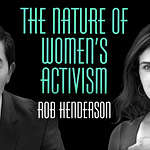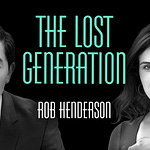You can catch the first episode here.
Some topics covered here in this second installment:
Discussing anthropologist David Gilmore’s fascinating insights from his book Misogyny: The Male Malady and how it connects with the themes of the recent film Nosferatu (you can read my review of the film here)
The richer the student body, the more protests you see. Research shows the wealthier the student body, the more demonstrations. Why don’t you see this at community colleges?
Thoughts on my upcoming event with Dr. Drew and what it was like to listen to his radio show “Loveline” as a kid in the early 2000s
A top writing coach quit teaching because ChatGPT is outperforming humans on many writing-related tasks. What does this mean for the future of writing? Personal stories and human experiences might be our best defense against the rise of AI-generated content.
My thoughts on why reading long-form content stays with you longer than quick-hit TikToks or tweets. Why economist Tyler Cowen says charisma matters more in the age of AI, and how I'm applying that to my own work.
Academia versus journalism: why ideological conformity persists in universities but less so in journalism, despite attracting similar types of people. I break down the incentives at play.
Thoughts on mentorship. Why helping younger people navigate their journeys can actually help you find clarity and satisfaction in your own life.
Thoughts on Nellie Bowles' recent book, Morning After the Revolution, where she takes us inside the chaos of 2020's "defund the police" era in cities like Seattle and Portland. So often utopian visions often lead to dystopian outcomes, especially when idealism collides with reality—something Bowles brilliantly illustrates.
Sharing thoughts on my forthcoming essay about F. Scott Fitzgerald’s underrated short story "Babylon Revisited"—a reflection on the decadence of the Roaring Twenties and its modern-day echoes.
I'm watching the new season of White Lotus, and there’s an intriguing shift happening in how HBO depicts political divisions. More evidence of a vibe shift?
Why we perceive Yellowstone as conservative and White Lotus as liberal, despite their messages suggesting otherwise.
What can Malaysia's experience with affirmative action teach America about DEI? I share insights from Thomas Sowell’s global perspective in his book Affirmative Action Around The World.
Amy Chua’s idea of "market-dominant minorities" intrigues me—how resentment toward successful minorities shapes social policies worldwide.
My unusual adoption story. I discuss why I’ve succeeded more than typical studies predict, and what that reveals about nature versus nurture.
Why I recently picked up a biography of Nietzsche—and what I’m hoping to discover about this profoundly misunderstood philosopher.










